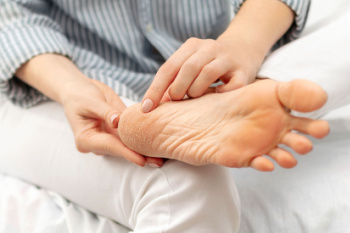
Cracked heels are a common foot condition that develops when the skin surrounding the heel becomes dry and thickened, unable to stretch normally. A primary cause is a lack of moisture which leads to reduced skin flexibility. Repetitive pressure and friction from walking, standing, or wearing ill-fitting footwear place added stress on the heel, causing the skin to split. The buildup of dead skin cells can further harden the area making cracking more likely. Certain medical conditions such as diabetes, eczema, and poor circulation may also weaken the skin and delay healing. A podiatrist can evaluate the underlying causes safely, remove hardened skin, recommend effective moisturizing treatments and manage related medical concerns. If you have developed cracked heels, it is suggested that you consult a podiatrist who can offer effective relief and treatment solutions, which may include prescribed medication.
If the skin on your feet starts to crack, you may want to see a podiatrist to find treatment. If you have any concerns, contact Robert Dunne, DPM from Lake Washington Foot and Ankle Center. Our doctor can provide the care you need to keep you pain-free and on your feet.
Cracked Heels
It is important to moisturize your cracked heels in order to prevent pain, bleeding, and infection. The reason cracked heels form is because the skin on the foot is too dry to support the immense pressure placed on them. When the foot expands, the dry skin on the foot begins to split.
Ways to Help Heal Them
- Invest in a good foot cream
- Try Using Petroleum Jelly
- Ease up on Soaps
- Drink Plenty of Water
Ways to Prevent Cracked Heels
- Moisturize After Showering
- Skip a Shower
- Keep Shower Water Lukewarm
- Don’t Scrub Your Feet
If you are unsure how to proceed in treating cracked heels, seek guidance from a podiatrist. Your doctor will help you with any questions or information you may need.
If you have any questions, please feel free to contact our offices located in Melbourne and Palm Bay, FL . We offer the newest diagnostic and treatment technologies for all your foot care needs.

Strong, flexible foot arches play an important role in balance, comfort, and long-term mobility. Gentle daily stretching can help reduce tension and improve circulation in the muscles that support the arch. The towel stretch is an easy option that lengthens the plantar fascia and calf by gently pulling the foot toward the body while seated. Another effective technique is the ball roll, which massages the arch and helps release tight tissue by slowly rolling the sole of the foot over a small ball. While these stretches can be helpful, persistent pain or stiffness may signal an underlying issue. A podiatrist can evaluate foot mechanics, identify contributing conditions, and create a personalized treatment plan that may include custom orthotics or advanced care. If you have pain in the arch of your foot, it is suggested that you consult a podiatrist who can offer effective relief tips, which may include additional arch stretches.
Why Stretching Is Important for Your Feet
Stretching the feet is a great way to prevent injuries. If you have any concerns with your feet consult with Robert Dunne, DPM from Lake Washington Foot and Ankle Center. Our doctor will assess your condition and provide you with quality foot and ankle treatment.
Stretching the Feet
Stretching the muscles in the foot is an important part in any physical activity. Feet that are tight can lead to less flexibility and make you more prone to injury. One of the most common forms of foot pain, plantar fasciitis, can be stretched out to help ease the pain. Stretching can not only ease pain from plantar fasciitis but also prevent it as well. However, it is important to see a podiatrist first to determine if stretching is right for you. Podiatrists can also recommend other ways to stretch your feet. Once you know whether stretching is right for you, here are some excellent stretches you can do.
- Using a foam roller or any cylindrical object (a water bottle or soda can will do), roll the object under your foot back and forth. You should also exert pressure on the object. Be sure to do this to both feet for a minute. Do this exercise three times each.
- Similar to the previous exercise, take a ball, such as a tennis ball, and roll it under your foot while seated and exert pressure on it.
- Grab a resistance band or towel and take a seat. If you are using a towel, fold it length wise. Next put either one between the ball of your foot and heel and pull with both hands on each side towards you. Hold this for 15 seconds and then switch feet. Do this three times for each foot.
- Finally hold your big toe while crossing one leg over the other. Pull the toe towards you and hold for 15 seconds. Once again do this three times per foot.
It is best to go easy when first stretching your foot and work your way up. If your foot starts hurting, stop exercising to ice and rest the foot. It is advised that you then see a podiatrist for help.
If you have any questions please contact our offices located in Melbourne and Palm Bay, FL . We offer the newest diagnostic and treatment technologies for all your foot and ankle needs.

Walking and running shoes are designed differently to match how the feet move during each activity. Walking shoes usually have a flatter shape with flexible soles that support a smooth heel to toe motion. Running shoes are often more curved and lightweight to absorb higher impact forces. Support also varies, as walking shoes focus on stability, while running shoes provide added structure to control motion during faster strides. Cushioning is typically firmer in walking shoes, while running shoes offer more shock absorption to protect joints from repeated impact. Choosing the wrong shoe can lead to foot, ankle, or knee discomfort. A podiatrist can help by evaluating gait, foot structure, and activity level to recommend proper footwear or custom orthotics. If foot pain or fatigue occurs during walking or running, it is suggested that you consult a podiatrist who can treat various foot conditions, and guide you on the correct shoes to wear for your desired activity.
For more information about walking shoes versus running shoes, consult with Robert Dunne, DPM from Lake Washington Foot and Ankle Center. Our doctor can measure your feet to determine what your needs are and help you find an appropriate pair of footwear.
Foot Health: The Differences between Walking & Running Shoes
There are great ways to stay in shape: running and walking are two great exercises to a healthy lifestyle. It is important to know that running shoes and walking shoes are not interchangeable. There is a key difference on how the feet hit the ground when someone is running or walking. This is why one should be aware that a shoe is designed differently for each activity.
You may be asking yourself what the real differences are between walking and running shoes and the answers may shock you.
Differences
Walking doesn’t involve as much stress or impact on the feet as running does. However, this doesn’t mean that you should be any less prepared. When you’re walking, you land on your heels and have your foot roll forward. This rolling motion requires additional support to the feet.
Flexibility – Walking shoes are designed to have soft, flexible soles. This allows the walker to push off easily with each step.
If you have any questions, please feel free to contact our offices located in Melbourne and Palm Bay, FL . We offer the newest diagnostic and treatment technologies for all your foot care needs.

